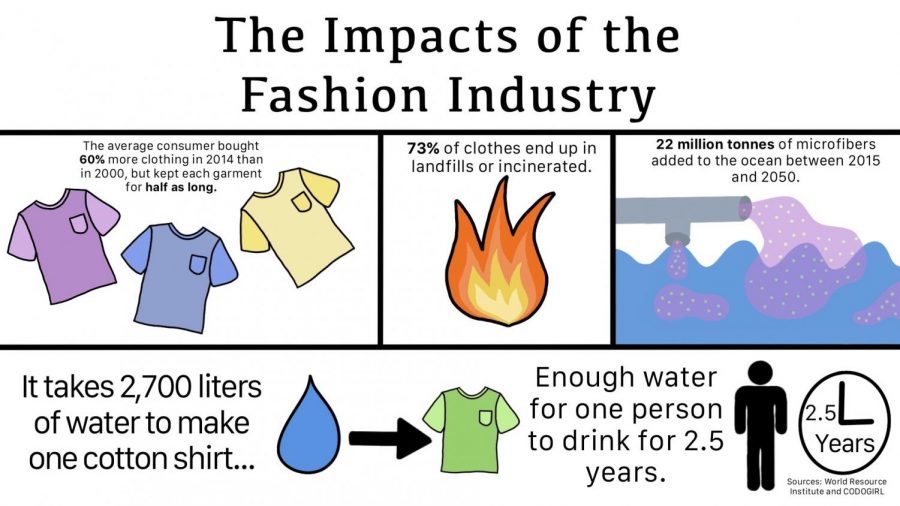Sustainable styles: Taking a stand against fast fashion
INEFFICIENT: This infographic demonstrates the different ways that fast fashion is environmentally unsustainable.
September 13, 2020
It took 2,700 liters of water, or about 9 bath tubs full of water, to make that shirt you are wearing. To make those jeans you own, manufacturers had to produce as much greenhouse gas needed to drive a car 80 miles. According to a study done by the World Resources Institute these numbers seem absurd, but are unfortunately true.
The fast fashion industry is deteriorating our planet faster than we can keep up. The appeal of fast fashion for many is completely understandable, even I have bought into their trap and consumed too much without really thinking about where or how these clothes were made. Sure the three dollar shirt off some sketchy website sounds great, but do you really know where it’s coming from? The fast fashion industry is responsible for discarding more than $400 billion worth of premature clothes.
Fast fashion is readily available and cheap which is appealing to consumers on a budget. As a high school student who does not have a high paying job like most adults I frequently find myself on those too-good-to-be-true websites like Shein and Romwe.
There are so many other potential options to fast fashion for people like thrifting, second hand shops, making your own clothes, and researching the ethical standpoint of companies. Thrifting is a great alternative for those on a budget. Donating old clothes is a great way to give back to your community as well.
Second hand shops sometimes can be more expensive compared to a regular thrift store, but they are usually more curated to nicer products. Online retailers like, TheRealReal, Depop, Etsy, and Poshmark make sure shoppers never even have to leave their couch. When buying from places like Etsy most of the money goes straight to the seller and you can find some really interesting and unique pieces on these sites too.
Researching the ethical morals of companies you buy from is important as well. Good On You, a brand that researches the ethical and moral background of companies around the world, is there to help shoppers. Good On You works with the United Nations and celebrities like Emma Watson to give ratings to companies based on their sustainability. Shoppers are now, more than ever, are able to research where their products are coming from.
Now I’m not saying to go on a rampage and burn all of your clothes in the name of fast fashion, but if we look at the ethical side of how and where our clothes come from we can all make a difference.
Going fully sustainable is not some easy jump, but by doing research, buying from sustainable companies, and thrifting and donating clothes we can strive to a more ethical fashion industry.


























